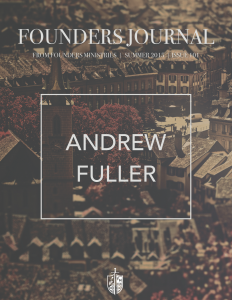Andrew Fuller’s The Gospel Worthy of All Acceptation (GWAA) received many replies from fellow Calvinists, but the most surprising reply must have come from the New Connexion General Baptist, Dan Taylor. Taylor identified himself as “Philanthropos” (lover of man). While he commended Fuller’s work, he held that a commercial view of the atonement was inconsistent with unlimited gospel invitations to sinners (a commercial view holds that Christ paid an exact penalty for an exact number of sins). This was a potential blow to the root of Fuller’s argument in GWAA.
In his Reply to Philanthropos, Fuller set out to address four main points of dispute: “[1] Whether regeneration is prior to coming to Christ, as a cause prior to its effect; [2] whether moral inability is or is not excusable; [3] whether faith in Christ is required by the moral law; and [4] whether an obligation upon all those to whom the gospel is preached to believe in Christ, and the encouragements held out to them to do so, is inconsistent with a limitation of design in his death.” On the first point Fuller affirmed the Calvinist position that regeneration both precedes faith and is its cause. On the second point, Fuller demonstrated the way in which he had been influenced by Jonathan Edwards’s distinction between moral and natural ability. Unlike Taylor, Fuller believed that mankind’s sin was inexcusable despite his lack of moral ability. On the third point, Fuller contended that the moral law obligates sinners to believe, while the Gospel encourages sinners to believe. According to Fuller, Taylor had overlooked this distinction.
The majority of Fuller’s Reply centers on the fourth point, GWAA’s most pertinent argument. In the First Edition of GWAA, Fuller maintained that both the commercial view and the “sufficient for all, efficient for the elect” view of the atonement were consistent with unlimited gospel invitations. However, in his Reply Fuller emphasized the atonement’s sufficiency “regarding the degree of Christ’s sufferings,” and placed the particularity in the “sovereign purpose and design of the Father and the Son.” As far as Fuller could tell, this was the historic view of “Calvinists in general,” and was consistent with unlimited Gospel invitations. This change is reflected in the Second Edition of GWAA.
The interaction between Andrew Fuller and Dan Taylor provides a helpful model for Christian theological debate. Fuller and Taylor were quite far apart on many theological points. They were honest about their disagreements. But their interaction was cordial, and they were both willing to consider the other’s arguments. On nearly every point, Fuller wielded his best arguments and pertinent biblical texts to demonstrate why he thought Dan Taylor’s critiques were unfounded. For example, Taylor contended that man’s sin was excusable if he did not have the moral ability to choose otherwise. Fuller considered this an egregious error. If man’s sin was excusable due to moral inability, reasoned Fuller, then the best thing Christians could do was not evangelize “the heathen,” but leave them without the Gospel, and therefore with excuse. Taylor’s theology did appear, on the surface, to be in man’s best interest. Yet as Fuller noted, it was in no way superior to his since it merely made salvation possible for the world, but could not ensure that one more person (or any person) would actually be saved.
Despite his vigorous rebuttal of Taylor’s arguments, Fuller was aware of the temptation of “idolizing sentiments.” In other words, what Fuller was after in his debate with Taylor was not merely winning an argument or defending his theological scheme, but arriving at truth. Fuller wrote near the end of his Reply: “Happy will it be for us all if truth be the sole object of our inquiries, and if our attachment to Divine truth itself be, not on account of its being what we have once engaged to defend, but what God hath revealed.” Fuller desired this for both Taylor and himself. We would do well to learn from Fuller’s exemplary model of firm conviction paired with a teachable spirit in pursuit of Divine truth.

















